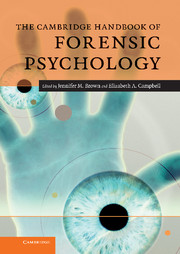Book contents
- The Cambridge Handbook of Forensic Psychology
- The Cambridge Handbook of Forensic Psychology
- Copyright page
- Dedication
- Contents
- Figures
- Tables
- Contributors
- Acknowledgements
- Forensic psychology:
- Part I Psychological underpinnings
- Part II Assessments
- Part III Interventions
- 3.1 Child sexual abuse
- 3.2 Clinical relevance of restorative justice
- 3.3 Crisis negotiation
- 3.4 Parenting programmes
- 3.5 Preventing delinquency and later criminal offending
- 3.6 Programmed interventions for offenders
- 3.7 Rediscovering recovery and rehabilitation in drug and alcohol services
- 3.8 Rehabilitation of offenders
- 3.9 Risk management
- 3.10 Suicide in prisons
- 3.11 Therapeutic communities
- 3.12 Treatment of sexual offenders
- 3.13 Rehabilitating violent offenders
- 3.14 Victims of terrorism
- Part IV Psychology and criminal behaviour
- Part V Psychology and civil law
- Part VI Special topics
- Part VII Professional practice
- Part VIII Research practice
- Author index
- Subject index
3.2 - Clinical relevance of restorative justice
from Part III - Interventions
Published online by Cambridge University Press: 06 July 2010
- The Cambridge Handbook of Forensic Psychology
- The Cambridge Handbook of Forensic Psychology
- Copyright page
- Dedication
- Contents
- Figures
- Tables
- Contributors
- Acknowledgements
- Forensic psychology:
- Part I Psychological underpinnings
- Part II Assessments
- Part III Interventions
- 3.1 Child sexual abuse
- 3.2 Clinical relevance of restorative justice
- 3.3 Crisis negotiation
- 3.4 Parenting programmes
- 3.5 Preventing delinquency and later criminal offending
- 3.6 Programmed interventions for offenders
- 3.7 Rediscovering recovery and rehabilitation in drug and alcohol services
- 3.8 Rehabilitation of offenders
- 3.9 Risk management
- 3.10 Suicide in prisons
- 3.11 Therapeutic communities
- 3.12 Treatment of sexual offenders
- 3.13 Rehabilitating violent offenders
- 3.14 Victims of terrorism
- Part IV Psychology and criminal behaviour
- Part V Psychology and civil law
- Part VI Special topics
- Part VII Professional practice
- Part VIII Research practice
- Author index
- Subject index
Summary
- Type
- Chapter
- Information
- The Cambridge Handbook of Forensic Psychology , pp. 354 - 360Publisher: Cambridge University PressPrint publication year: 2010
- 1
- Cited by

